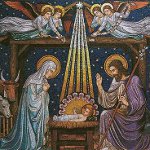Christmas in Eastern Christianity Date in the current year: January 7, 2026
 Most Christian denominations, except for the Armenian Apostolic Church and the Armenian Patriarchate of Jerusalem, celebrate the Nativity of Jesus on December 25. However, some Eastern churches still use the old Julian calendar that falls 13 days behind the Gregorian calendar. This means that Christmas in Eastern Christianity is actually celebrated on January 7.
Most Christian denominations, except for the Armenian Apostolic Church and the Armenian Patriarchate of Jerusalem, celebrate the Nativity of Jesus on December 25. However, some Eastern churches still use the old Julian calendar that falls 13 days behind the Gregorian calendar. This means that Christmas in Eastern Christianity is actually celebrated on January 7.In the Eastern Orthodox, Oriental Orthodox, and Eastern Catholic Churches, Christmas is preceded by the 40-day Nativity Fast. In the Eastern Orthodox Church, it traditionally entails abstaining from meat, eggs, dairy products, fish, oil, and wine, although fish, oil and/or wine are allowed on certain days. Some devout Christians completely abstain from food during Christmas Eve until the first star appears in the sky, representing the Star of Bethlehem.
Christmas-themed church services begin on Christmas Eve. They include the Royal Hours and Vespers combined with the Divine Liturgy. After that, parishioners return home for the traditional Christmas Eve supper consisting of twelve Lenten dishes, representing the Twelve Apostles. After the supper, devout families return to church for the All-Night Vigil, followed by the Christmas morning service (Orthros).
Christmas dinner isn’t considered as important as Christmas Eve supper. It’s more of a fast break meal where people enjoy meat, rich desserts, alcohol, and other foods and dishes that were prohibited during the Nativity Fast. It’s customary to invite friends and relatives to Christmas dinner or pay them a visit yourself, bringing some kutia (a traditional Christmas dish made of wheat berry, honey, poppy seeds, nuts, and dried fruits).
Orthodox Christmas is a public holiday in some countries, including Belarus, Bosnia and Herzegovina, Egypt, Ethiopia, Eritrea, Georgia, Kazakhstan, Kyrgyzstan, Macedonia, Moldova, Montenegro, Russia, Serbia, Sudan, and Ukraine. Interestingly, in Ukraine, both Catholic Christmas (December 25) and Orthodox Christmas (January 7) are public holidays.
Unlike in the West, Christmas is mainly a religious event in most post-Soviet states because most of its secular aspects (Christmas tree, decorations, gift giving) are now associated with New Year’s Day. This has happened because of the Soviet Union’s anti-religion policy that discouraged religious celebrations. While some of the religious traditions have been revived, for non-religious people Christmas is just another day off.
Carol signing is one of the Christmas traditions that’s still associated with Christmas rather than New Year, although it is becoming less and less common in big cities. Children and young people dress up in costumes and go from house to house, signing carols that glorify Jesus Christ and sometimes also praise those who listen to carols. As a reward, carol singers are given sweet treats or money.
Back in the old times, caroling and mummer’s parades were a huge tradition in Russian and Ukrainian villages. Christmas Day opened the festive season known as Svyatki that lasted until Epiphany and was filled with various customs and traditions, some of which, like divination, stemmed from pagan rites and rituals.
- Category
- Religious Holidays
- Country
- Belarus, Bosnia and Herzegovina, Georgia, Kazakhstan, Kyrgyzstan, North Macedonia, Moldova, Montenegro, Russia, Serbia, Sudan, State of Palestine
- Tags
- Christmas, Christmas in Eastern Christianity, Orthodox Christmas, Coptic Christmas, public holidays, religious holidays